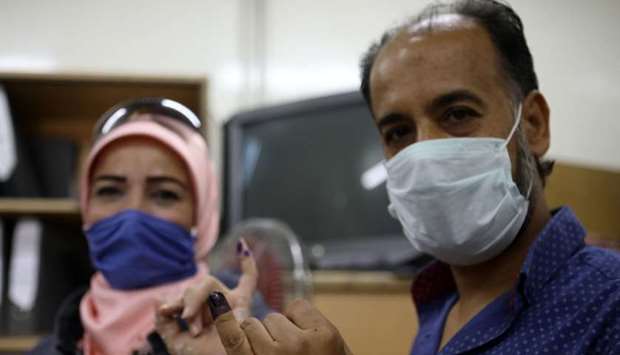Syrians voted Sunday to elect a new parliament as the Damascus government grapples with international sanctions and a crumbling economy after retaking large parts of the war-torn country.
More than 7,400 polling stations opened across government-held parts of Syria, including for the first time in former opposition strongholds, the electoral commission said.President Bashar al-Assad's Baath party and its allies are expected to take most of parliament's 250 seats in the third such polls to be held since the war started nine years ago.
In Damascus, dozens of voters -- some in face masks to prevent the spread of the novel coronavirus -- headed to polling stations to cast their ballots, an AFP correspondent said.
Inside one centre, several posted their choice in a sealed envelope into a plastic ballot box, as organisers in face coverings and gloves looked on.
Nearby, volunteers carried the programmes and pictures of their candidates of choice, and tried to draw in passersby to come in a vote.
Hana Sukriye, 29, a employee at the finance ministry, said she was voting for the first time in her life.
"My vote alone won't make a difference, but if we all come together to choose worthy candidates, there will be an impact and change," she said.
"Everybody needs to choose now so that they can later hold accountable and object to the performance of candidates who get elected" if necessary.
On the eve of the polls, one person was killed and another wounded in a blast in Damascus, state news agency SANA said, but the cause of the explosion was not immediately clear.
Several lists were allowed to run across the country but any real opposition is absent, and the ruling Baath party is expected to retain its hegemony.
Portraits of the contenders have been displayed across the capital for weeks, with the 1,658 candidates including several prominent businessmen.
The elections, twice postponed from April due to the coronavirus pandemic, come at a time when most Syrians are worried about the soaring cost of living.
Many candidates are running on programmes pledging to tackle inflation and improve infrastructure ravaged by the conflict.
"Lawmakers are going to have to make exceptional efforts to improve services," said Umaya, a 31-year-old woman who works in a dentist's practice.
Millions of Syrians living abroad, after fleeing a war that has killed more than 380,000 people, are not eligible to vote.
But for the first time, voting will take place in territory retaken by the government, including in the Eastern Ghouta region outside Damascus and in the south of Idlib province in the country's northwest.
After a string of military victories backed by key ally Russia, the government is back in control of around 70 percent of the country, the Syrian Observatory for Human Rights war monitor says.
In the last polls in 2016, turnout stood at 57 percent.
This year's vote comes as Damascus struggles to redress an economy battered by nine years of war, Western sanctions and the fallout of a financial crisis in neighbouring Lebanon.
Food prices in Syria have shot up by more than 200 percent in the past year and now stand at 20 times their pre-war levels, the World Food Programme says.
In a country where more than 80 percent of people already live in poverty, the UN food agency has warned that Syrians are now facing an "unprecedented hunger crisis".
The elections also come as Assad marked a second decade in power this month, and weeks after the United States imposed new sanctions on Syria including on the president's wife.
The next presidential polls are expected in 2021, and candidates will need the written approval of at least 35 members of parliament.
Foreign Minister Walid al-Muallem last month said Assad would remain in power "as long as the Syrian want him to stay".
Syria has officially recorded 496 cases of the novel coronavirus, including 25 deaths in government-held areas.

